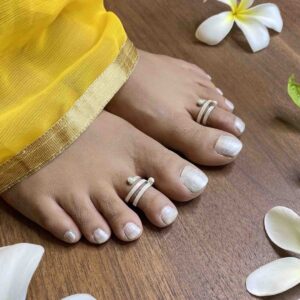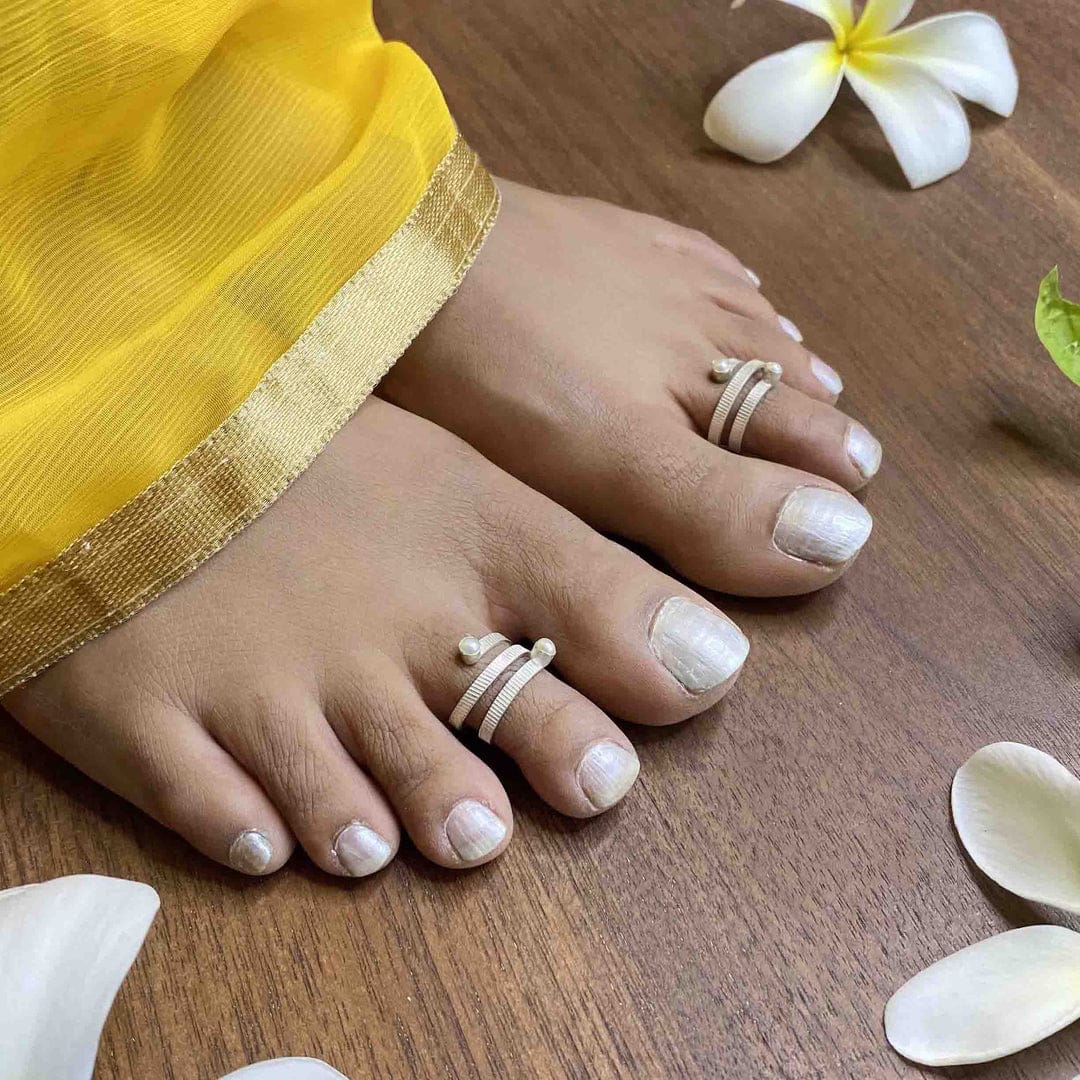 Ayurveda, the ancient Indian system of medicine, offers a holistic view of health and well-being, emphasizing the interconnectedness of the body, mind, and spirit. In this system, the body is believed to be composed of energy channels, known as “nadis,” through which “prana” (life force) flows. These nadis are associated with various bodily functions, including the functioning of the reproductive system. The practice of wearing toe rings in Indian culture is thought to influence these energy channels and thereby support a woman’s reproductive health, particularly in regulating the menstrual cycle.
Ayurveda, the ancient Indian system of medicine, offers a holistic view of health and well-being, emphasizing the interconnectedness of the body, mind, and spirit. In this system, the body is believed to be composed of energy channels, known as “nadis,” through which “prana” (life force) flows. These nadis are associated with various bodily functions, including the functioning of the reproductive system. The practice of wearing toe rings in Indian culture is thought to influence these energy channels and thereby support a woman’s reproductive health, particularly in regulating the menstrual cycle.
1. Connection Between Nerves and Reproductive Organs:
- In Ayurveda, the body is seen as a network of interconnected pathways where physical and subtle energies flow. The second toe, where the toe ring is traditionally worn, is believed to be linked to the reproductive organs through nerve pathways. These pathways are thought to connect the toe with the uterus and other parts of the reproductive system. By wearing a toe ring, gentle and continuous pressure is applied to these nerves, stimulating them in a way that is believed to support the healthy functioning of the reproductive organs.
- This stimulation may help in maintaining the tone and health of the uterus, which is crucial for regular menstrual cycles. It’s akin to reflexology, where specific points on the feet are thought to correspond to different organs in the body.
2. Hormonal Regulation:
- Hormones are vital for the regulation of the menstrual cycle. The endocrine system, which produces and regulates hormones, is influenced by various factors, including nerve stimulation. In Ayurveda, the continuous pressure from the toe ring is believed to affect the nerves connected to the reproductive organs, which in turn may influence the endocrine system.
- By helping to balance hormone production and regulation, the toe ring is thought to contribute to more regular menstrual cycles. This could potentially alleviate common menstrual symptoms such as irregular periods, painful cramps, and hormonal imbalances.
3. Improving Energy Flow:
- Ayurveda emphasizes the importance of prana, or life energy, which flows through the nadis. For optimal health, it’s essential that prana flows freely and without obstruction. When energy flow is blocked or imbalanced, it can lead to various health issues, including menstrual irregularities.
- The toe ring is believed to keep the energy channels associated with the reproductive organs open and balanced. By ensuring a smooth flow of energy, the toe ring may help in maintaining regular and healthy menstrual cycles.
4. Balancing Vata Dosha:
- In Ayurveda, the body’s functions are governed by three doshas: Vata, Pitta, and Kapha. Each person has a unique balance of these doshas, which influences their physical and mental health. Vata dosha is particularly associated with movement, including the movement of blood, nerve impulses, and menstrual flow.
- An imbalance in Vata can lead to issues like irregular periods, painful cramps, and excessive menstrual flow. The toe ring, by grounding and stabilizing Vata, is thought to help in maintaining a balanced menstrual cycle. This grounding effect is particularly important because Vata is easily disturbed by stress, anxiety, and irregular lifestyles, all of which can affect menstrual health.
5. Preventing Menstrual Discomfort:
- Many women experience discomfort during their menstrual cycles, including cramps, bloating, and mood swings. The toe ring’s stimulation of the nerves and energy channels is believed to prevent or reduce these symptoms by supporting overall hormonal balance and improving blood circulation to the reproductive organs.
- This can lead to a smoother menstrual experience, with less pain and discomfort, allowing women to maintain their daily activities with greater ease.
Traditional Beliefs vs. Modern Science:
While these ideas are deeply rooted in Ayurvedic tradition and have been practiced for centuries, they are not scientifically validated by modern medical research. Ayurveda is a holistic system that combines physical, mental, and spiritual health, and its practices are based on centuries of observation and experience rather than on clinical trials or modern scientific studies.
However, many women in Indian culture continue to wear toe rings as part of their cultural and spiritual practices, believing in the potential benefits for their reproductive health and menstrual well-being. While the scientific evidence may be limited, the cultural significance and the personal experiences of those who follow these traditions play an important role in maintaining these practices.
